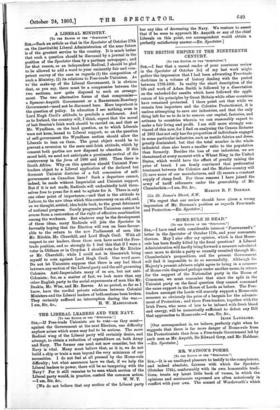A LIBERAL MINISTRY.
[To THE EDITOR OF THE "Seam:my-1 SIR,—Such an article as that in the Spectator of October 17th on the (inevitable) Liberal Administration of the near future is of the greatest service to the country. It is much better that such a question should be discussed by a journal in the position of the Spectator than by a partisan newspaper ; and for that reason, as an independent Radical, I should be glad to be allowed to add a word to your eminently fair and com- petent survey of the case as regards (1) the composition of such a Ministry, (2) its relations to Free-trade Unionism. As to the make-up of the Liberal Government, it is obvious that, as you say, there must be a compromise between the two sections, now quite disposed to such an arrange- ment. The two alternative forms of that compromise— a Spencer-Asquith Government or a Bannerman-Rosebery Government—need not be discussed here. More important is the question of policy. In education I see nothing, even in Lord Hugh Cecil's attitude, to preclude a settlement. And as to Ireland, the country will, I think, expect that the moral of last Session's Irish work should be carried on, and that as Mr. Wyndham, on the land question, as to which Liberals were not keen, leaned to Liberal support, so on the question of self-government the Wyndham section should allow the Liberals to lean on them. The great object would be to prevent a reversion to the mere anti-Irish attitude, which by consent both parties are now disposed to abandon. If this mood held, we need not anticipate a proximate revival of the controversy in the form. of 1886 and 1892. Then there is South Africa. Why on this question should Unionist Free- traders object to a Liberal application of the declared but dormant Unionist doctrine of a full concession of self- government on Canadian lines ? Such a departure cannot, indeed, be made without Imperialist and Unionist support. But if it is not made, Radicals will undoubtedly hold them- selves free to press for it and to agitate for it. There is only one other point of importance,—and that is the attitude to Labour, to the new ideas which this controversy on an old, and, as we thought, settled, idea holds back, to the great detriment of national progress. Surely progressive Unionism cannot be averse from a restoration of the right of effective combination among the workmen. But whatever may be the development of these ideas, many Radicals will join the Spectator in fervently hoping that the Election will run on lines favour- able to the return to the new Parliament of men like Mr. Ritchie, Mr. Churchill, and Lord Hugh Cecil. With all respect to our leaders, these three men have saved the Free- trade position, and so strongly do I feel this that if I were a voter in Oldham or in Croydon I should vote for Mr. Ritchie or Mr. Churchill; while I could not in Greenwich bring myself to vote against Lord Hugh Cecil. One word more. Do not let Unionists suppose that there is any bad blood between any section of the Liberal party au d the self-governing Colonies. Anti-Imperialists many of us are, but not anti- Colonists ; for, as a matter of fact, we look more than any other English party to the social experiments of men like Mr. Deakin, Mr. Wise, and Mr. Reeves. At no period, so far as I know, have the cordial private relations between Colonial Ministers and the Liberal leaders of both sections been broken. They certainly suffered no interruption during the war.—






















































 Previous page
Previous page